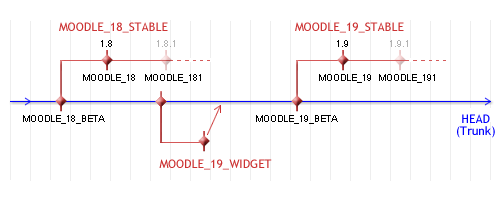Hi,
I would like to get hold of old versions of Moodle for research purposes. Has anyone any idea where I could get these?
Thanks,
Eamon
+1 for CVS spelunking  Some ideas:
Some ideas:
- Use cvsps to collect stats and patchsets - eith a few scripts you can generate stats on commits per month, committers per month, lines of code changed per month, etc. Or between releases. Similar to cvsps but less useful: cvs2cl.
- It might be valuable to run sloccount across different historical versions - remember to exclude lang and the various imported libraries (like AdoDB).
- Use cvsps to collect stats and patchsets - eith a few scripts you can generate stats on commits per month, committers per month, lines of code changed per month, etc. Or between releases. Similar to cvsps but less useful: cvs2cl.
- It might be valuable to run sloccount across different historical versions - remember to exclude lang and the various imported libraries (like AdoDB).
Hi and Thanks for all of your help on this.
I finally got some time to come back to this and am trying to some Moodle archeology.
I have a script that downloads old Moodle releases via CVS. For some Moodle releases I get a No Such Tag error e.g. MOODLE_155
Are these releases not in the repository or do I have the tag name wrong?
I can't find:
1.3.2 - 1.3.3
1.3.6 - 1.3.9
1.4.6 - 1.4.8
1.5.5 - 1.5.9
1.7.8 - 1.7.9
1.8.9
any help greatly appreciated.
- Eamon
I finally got some time to come back to this and am trying to some Moodle archeology.
I have a script that downloads old Moodle releases via CVS. For some Moodle releases I get a No Such Tag error e.g. MOODLE_155
Are these releases not in the repository or do I have the tag name wrong?
I can't find:
1.3.2 - 1.3.3
1.3.6 - 1.3.9
1.4.6 - 1.4.8
1.5.5 - 1.5.9
1.7.8 - 1.7.9
1.8.9
any help greatly appreciated.
- Eamon
Some of those are not releases yet  For example, 1.7.7 and 1.8.8 were only announced yesterday.
For example, 1.7.7 and 1.8.8 were only announced yesterday.
For example, 1.7 is a branch, and the .x after that is a point release in that branch. Branches run in parallel. We do not release number-sequentially through 1.7.7 -> 1.7.8 -> 1.7.9 -> 1.8.0 -> 1.8.1 . However the number sequence does apply when considering an upgrade (you can only upgrade to higher-numbered versions).
This diagram explains the branching:

This history of Moodle releases will be helpful:
http://docs.moodle.org/en/Moodle_version_history
For a fairly authoritative list of tags, look at the "Sticky tag" menu on this log for the main index.php file:
http://cvs.moodle.org/moodle/index.php?view=log
For example, 1.7 is a branch, and the .x after that is a point release in that branch. Branches run in parallel. We do not release number-sequentially through 1.7.7 -> 1.7.8 -> 1.7.9 -> 1.8.0 -> 1.8.1 . However the number sequence does apply when considering an upgrade (you can only upgrade to higher-numbered versions).
This diagram explains the branching:

This history of Moodle releases will be helpful:
http://docs.moodle.org/en/Moodle_version_history
For a fairly authoritative list of tags, look at the "Sticky tag" menu on this log for the main index.php file:
http://cvs.moodle.org/moodle/index.php?view=log
Hi Brian,
If there was to be another 1.6 release, then I imagine it would be called 1.6.10. However, as Martin mentioned in his announcement New releases: Moodle 1.9.4, 1.8.8, 1.7.7 and 1.6.9, "Moodle 1.6.9 and Moodle 1.7.7 mark the last builds that the core team plan to release from those branches (unless someone else volunteers to maintain them) due to the amount of work involved."
If there was to be another 1.6 release, then I imagine it would be called 1.6.10. However, as Martin mentioned in his announcement New releases: Moodle 1.9.4, 1.8.8, 1.7.7 and 1.6.9, "Moodle 1.6.9 and Moodle 1.7.7 mark the last builds that the core team plan to release from those branches (unless someone else volunteers to maintain them) due to the amount of work involved."